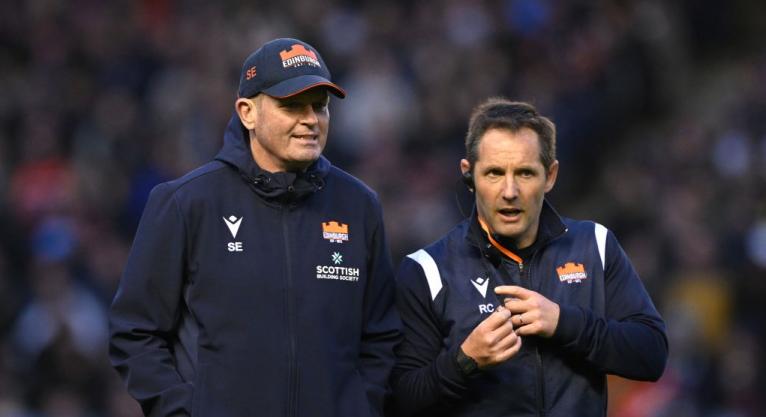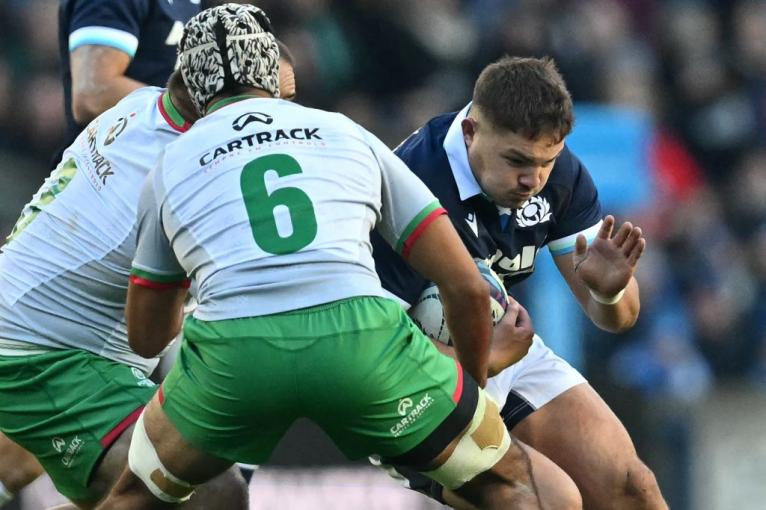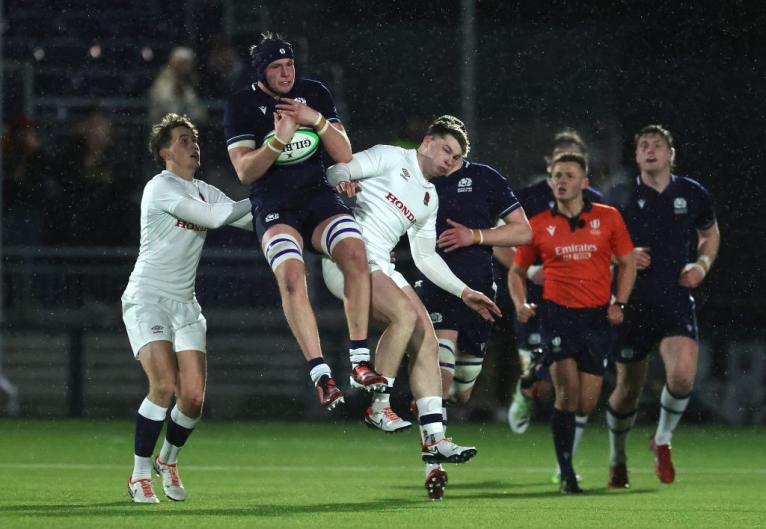In his first fifteen minutes of professional rugby, Freddy Douglas never actually touched the ball. He didn’t need to, for his vaunted class and snarl to shine brightly in the Murrayfield moonlight.
Within a few minutes, Douglas had tackled five Portuguese players. When the full-time whistle sounded, that tally had risen to seven. John Dalziel, the Scotland forwards coach, said recently Douglas is “already world class” and while a cameo against a Tier Two nation is hardly grounds for heralding the next Richie McCaw, there was enough in his brief maiden showing to back up the hype.
It’s a strange thing to articulate, but Douglas just moves like a top open-side. He has the look of a big cat stalking its prey; a spider waiting for the vibrations of an unfortunate fly snared in its web. You could see it in his explosive defence, his eagerness to resource breakdowns, and his nous in selecting when, and when not, to plunge on the jackal.
First professional match ✅
First cap for Scotland ✅A moment to remember for 19-year-old Freddie Douglas as he steps on for his first cap for Scotland in his first ever professional match 😳#AutumnNationsSeries #SCOvPOR pic.twitter.com/4Ryb62oo0T
— Rugby on TNT Sports (@rugbyontnt) November 16, 2024
Douglas has chased this breakthrough for an age, not that he can truly have believed it would come this soon. He took up yoga at 14 to pursue excellence in the trench warfare of modern rucking. He made more tackles and more steals than any other player in this year’s Under-20 Six Nations, delivering serial displays of sheer defiance in a team repeatedly savaged by its age-grade rivals. He was the exceptional player in Edinburgh’s early-season A fixtures, winning five breakdown turnovers in a single match against Glasgow.
And yet, Douglas has not come within 100 miles of an Edinburgh senior match. How can it be that such a searing wonderkid plays for his country before his club, in what we’re constantly told is a modest talent pool? How can more than six decades have passed since a player of Douglas’ age last pulled on the navy blue jersey?
Edinburgh are in a precarious spot. Their squad has been lavishly assembled and it has not yielded results reflective of its pedigree. They fell short of the URC play-offs last season; a shamefully poor return on the investment made in personnel. Sean Everitt needs to win rugby matches more urgently than blood young players and his back-row is stacked with internationals. In Douglas’ position alone, Hamish Watson, Luke Crosbie, Ben Muncaster and the injured Connor Boyle block the path to a matchday slot. Edinburgh began their season against Leinster at home, then went to Pretoria and Johannesburg, before some kinder fixtures rounded off the opening URC block. They managed only two wins and sit tenth. Everitt has been questioned and criticised.

“At the moment it’s tough to get into the senior group,” he said when the Scotland squad was announced last month.
“Looking at the start that we had and the number of senior loose forwards that we have, it wasn’t our plan to play Freddy in the first block but, going forward, he is continuously putting up his hand for selection and he could be rewarded.”
This is the great conundrum facing coaches in Scotland, with its two-team model and bottleneck of players. Sure, it’s better to have a surplus of quality than, say, the existential horrors suffocating Welsh rugby, but it also applies unique pressure on those calling the shots. Everitt has a responsibility to nurture local talent (and a track record in doing so at the Sharks) but if he oversees another meek season, his jacket will dangle on the shoogliest of pegs. Would the coach be compelled to risk a teenager when he has three Test men, one a British and Irish Lion, at his disposal, his job is at stake and the league fiendishly competitive? What’s best for Edinburgh in the short term isn’t necessarily best for Scottish rugby’s future. These are the plates Everitt must spin.
Before the South African’s appointment last summer, Rudi Brown, a back-row like Douglas and one of Scotland’s better age-grade players of recent seasons, left for Vannes when it became clear Edinburgh did not rate him. Full-back Harry Paterson had played eight Edinburgh matches before being thrust into a leading role for Scotland against France back in February. Little wonder when Edinburgh boast such glittering back-three rapiers as Duhan van der Merwe, Darcy Graham, Emiliano Boffelli and Wes Goosen.

At hooker, Patrick Harrison has won his first three caps this year but faced an interminable wait for sustained club minutes. Everitt has often preferred Dave Cherry as Ewan Ashman’s backup, for his vast experience and set-piece knowhow. Harrison, too, was a star of the U20s scene. He got his first sniff of pro rugby under Mike Blair during an injury crisis and consistently scored big tries, before a fruitful loan stint at London Irish. He has dynamism and dog prized by Gregor Townsend, but played only 38 minutes of club rugby last season, and started successive Edinburgh games for the first time just last month. Harrison is 22 now; A games and fleeting opportunities will no longer sate his ambition or fuel his growth.
Others are yearning for a crack. Tom Currie – younger sibling of Scotland centre Matt – is a stand-out. Liam McConnell, Douglas’ age-grade captain, has a similarly high ceiling. McConnell was playing semi-professional rugby at 17, and setting the best fitness scores in the U20s side a few months later. When he was first called in to train with Edinburgh, senior players were taken aback by his caustic tongue as well as his obvious ability. After a shellacking by the Irish youths in 2023, most of the Scotland boys lingered on the pitch with their families for pictures and small talk. Nothing wrong with that, of course – these are achievements worth savouring – but it wasn’t for McConnell. Furious and hurting, he strode up the tunnel and resolved to be better next time. McConnell will be worth the wait. We’ll get a closer look at him on Saturday when he plays in the Scotland A back-row against Chile.
There’s a clear contrast on the western end of the M8, where the culture and success fostered by Franco Smith has allowed him to field numerous burgeoning youngsters. Max Williamson played like a beast in the second-row on the URC title trail. Alex Samuel, Gregor Brown, Euan Ferrie, Ben Afshar, Duncan Munn, Gregor Hiddleston and Angus Fraser have all seen action. Many are regular Warriors. Three are now full internationals. Everitt hasn’t driven Edinburgh to the point where he feels he can drip-feed in many of his own academy products.
The rise of these tyros disproves the theory Scotland does not develop enough talent, or that continually grim results at U20 level are an indication of dwindling resources. The system around these players needs to better prepare them for the rigours of elite rugby, but the quality is patently there. The newly staged A games should provide a better standard of competition for those on the fringes than the Super6 which went before. There’s an understanding across the whole game players need to come through faster, and in greater numbers.

Douglas, clearly, has a tantalising future. Word is, he has Irish and English links and Pat Lam has been prowling in the hope of luring him to Bristol. He’s been whacking top Test forwards in training and generally making a terrific impression on the Scotland coaches. People talk about his cussedness, his grit, his unwavering determination to make it.
To watch the tears stream down his face during the anthem, to see the 19-year-old gaze around the Murrayfield bowl and puff out his cheeks as he ran on to the field, was to witness the culmination of a deep-rooted dream. Pride, euphoria, disbelief – they were all swirling around the young man’s head. There can be few purer sights in sport. The hope is, Scottish rugby gets to see it a little more often.


He's like Henry Pollock for England...except Henry Pollock won't get picked for a few seasons before which he'll end up going to France and be the next Jack Willis 🤣